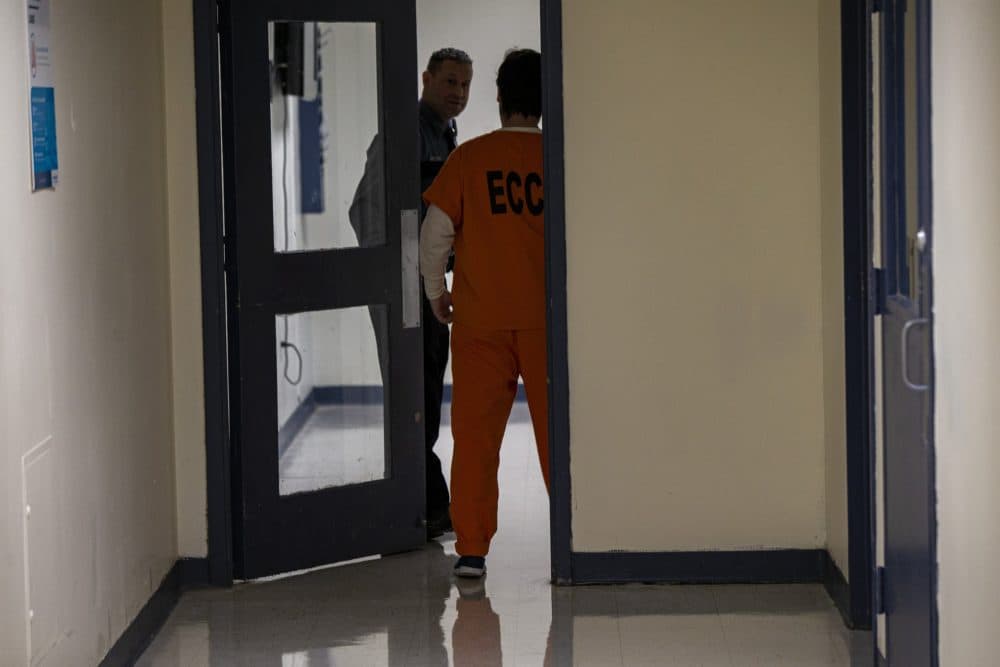Advertisement
Commentary
The Pandemic Shouldn't Deprive Prisoners Of Their Rights

Last week, several men and women with preexisting health concerns were released from pretrial custody — some to home confinement, some with GPS monitoring — by agreement with the Suffolk County prosecutor. Each represented one less person imprisoned without due process; one less person to get infected with the coronavirus behind bars.
Since at least March 19, Suffolk County authorities have been working with defense lawyers to identify non-violent prisoners for release from custody as a means of preventing the spread of COVID-19 in the county’s jail population. Central to the task, Suffolk District Attorney Rachael Rollins recognizes that the virus poses a unique problem for those in custody, particularly those who are most vulnerable due to age or illness, and who do not have the ability to create social distance.
Not every county agrees.
In Worcester, I heard how one defense attorney’s request for a reduction in bail was met with this response from one assistant district attorney: “Jail tells me there’s no coronavirus cases there. Inmates have obviously not travelled to infected areas." Defense attorneys report that in other counties, there is talk of release but no action. A Norfolk Superior Court judge erroneously claimed he had no authority to revisit bail. And in Hampden County, the district attorney’s office has no policy at all.
In New York City, in less than one week, more than 38 people tested positive at Rikers Island and nearby facilities, more than half of them incarcerated men. Officials there anticipate cases may skyrocket, and are advocating for rapidly decreasing the population in order to protect the prison community. In Iran, 85,000 prisoners were released to curb the spread; Turkey, too, is poised to release thousands.
But we hardly need to look outside our own correctional system.
Without a uniform policy of de-incarceration ... the wings in our prisons and jails will be converted to hospital units
At the Bridgewater Treatment Center, a correctional facility where 75% of the population is over the age of 50, six prisoners (so far) have tested positive for COVID-19. Although placed in isolation, they live in a facility where men attend treatment groups every day — groups which continued up until the end of last week. Undoubtedly, the men in his unit were exposed, as were the correctional staff who floated to other units, and any visitor who stopped over before visits were suspended.
As aptly noted by the Worcester assistant district attorney, inmates have not travelled to infected areas, so somebody from the outside brought it in.
Lurking beneath this public health crisis is a very real constitutional crisis, because the men and women who are awaiting trial in jail are currently unable to get their cases before a judge or a jury.
Due process (as defined by the Fifth and Fourteenth Amendments) requires that before depriving a citizen of life, liberty or property, the government must follow the law and provide fair procedures. Instead, those in jail sit idly waiting for their day in court, their rights to speedy trial waived by judicial order.
Advertisement
Legal visits currently happen through glass partitions (if at all), with lawyers and their clients equally vulnerable to exposure. Neither the police stations, the county jails nor the state prisons have any protocol permitting confidential communications over the phone, requiring lawyers and defendants to choose between potential exposure or the right to counsel — however limited that right may be.
Without a uniform policy of de-incarceration, both through reduced bails and early release of non-violent offenders, the wings in our prisons and jails will be converted to hospital units, with too few beds and resources to accommodate either the sick or those yet to be infected who remain in custody.
Currently, there is emergency legislation, Bill HD.4963, that seeks to create a uniform policy of de-incarceration. The bill calls for the Massachusetts Office of Pretrial Services to review each case and work with public health officials, public defenders, the district attorneys, the courts, and sheriffs to immediately release those who pose no immediate threat to the community, including those charged with controlled substance offenses. Simultaneously, emergency petitions are being drafted, urging the state’s highest court to act expeditiously to depopulate the jails and prisons before the virus takes hold.
Now is the time for all branches of government to act in unison — through the courts, the district attorneys’ offices and the Legislature — to protect not only our most vulnerable citizens, but to uphold our Constitution.
